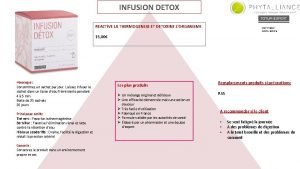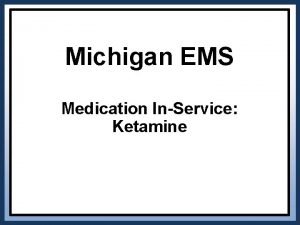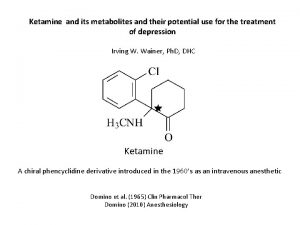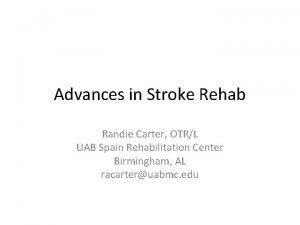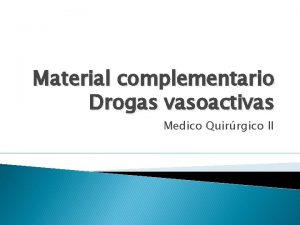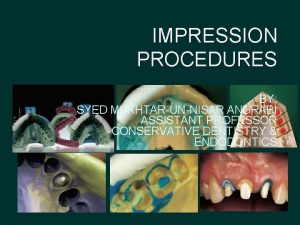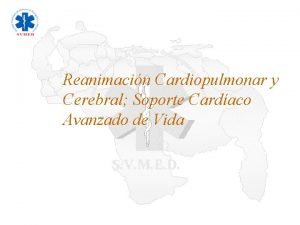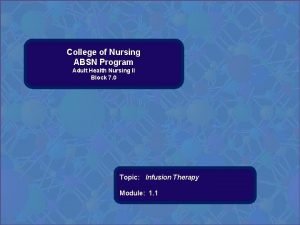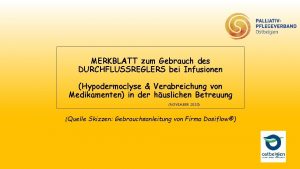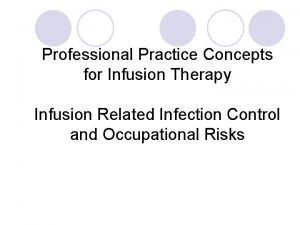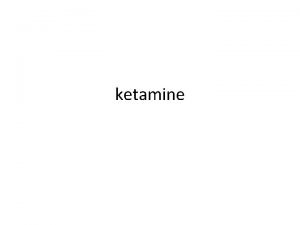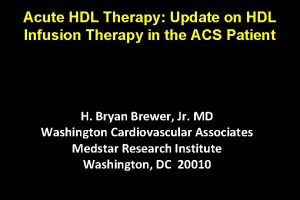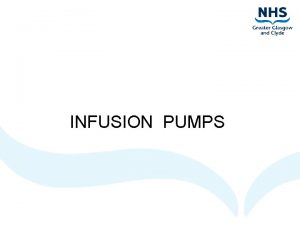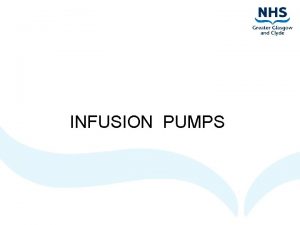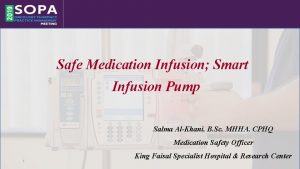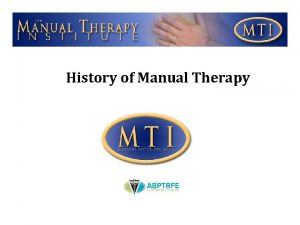Ketamine Infusion Therapy Ketamine What is Ketamine Ketamine

















- Slides: 17

Ketamine Infusion Therapy

Ketamine What is Ketamine? Ketamine is an FDA approved medication used in anesthesia and sedation. It was discovered in 1962 and has been used in humans since 1970. In recent years, mounting evidence generated by many clinical trials and studies has shown Ketamine to be very effective in the treatment of chronic pain syndromes, refractory depression, OCD, PTSD, and other conditions as well. While it is not yet FDA approved for these applications, several ongoing studies are showing very positive results, providing promise that FDA approval may be granted in the near future.

Why Ketamine? Ketamine works very differently than traditional antidepressants, psychiatric medications or pain medications. It works on the NMDA receptor to improve or repair faulty nerve function, referred to as “Neuromodulation”. Ketamine has been shown to produce rapid anti-depressant and pain relieving affects, as well as rapid reduction in the debilitating symptoms of OCD and PTSD. These results typically last long after the medication has been metabolized. For patients who have not responded well to multiple trials of conventional medications or electroconvulsive therapy, Ketamine can be life-changing.

Why Ketamine Left: Change in the 21 -item Hamilton Depression Rating Scale (HDRS) following ketamine or placebo treatment. *See Link to the HDRS Assessment on last slide Right: Proportion of responders showing a 50 percent improvement on the HDRS following ketamine or placebo treatment. * *Source: Carlos Zarate, M. D. , Experimental Therapeutics and Pathophysiology Branch, NIMH

Why Physicians Urgent Care? At Physicians Urgent Care, you will be treated by board-certified Emergency Physicians who are very familiar with Ketamine and have been using it regularly in the ER for many years for sedation and anesthesia, typically at much higher doses than is used for infusion therapy Our physicians routinely care for patients in the ER with severe depression, PTSD and chronic pain who have not responded to medications, psychotherapy and/or electroconvulsive therapy. Ketamine is providing significant relief to thousands of people and our physicians want to help pave a path forward for many more. Our providers are on the front lines of the opioid epidemic and have witnessed first hand the great harm these pain medications can cause to individuals and their families. Several of our physicians are US military veterans. As such, we recognize how severe trauma can lead to the devastating effects of PTSD, depression and chronic pain. We hope that our Ketamine Infusion Therapy can provide these patients with some relief.

Ketamine: Indications -Severe or “treatment-resistant” depression -Bipolar disorder -PTSD -OCD -Complex regional pain syndrome -Migraines -Neuropathic pain -Fibromyalgia -RSD -Other pain syndromes; Physician discretion

Ketamine: Contraindications -Active psychotic symptoms -Schizophrenia -Mania -Substance abuse -Uncontrolled Hypertension -Congestive heart failure or significant coronary artery disease -Patients on MAOI’s or certain other medications -Strokes / Increased intracranial pressure -Pregnancy or breast feeding -Prior reaction to anesthesia -Significant comorbidities or systemic disease. (Physician discretion).

Ketamine: Side Effects Most people tolerate ketamine very well. It does not suppress breathing and has been used safely for decades. Unfortunately, Ketamine has also been abused as a street drug (in MUCH higher doses and uncontrolled settings) and has earned a negative reputation with some who do not understand its medical utility. Ketamine has not been found to be addictive when administered properly and appropriately. It does not cause a “high” or unexpected “flashbacks”. There are other very rare potential side effects or adverse reactions. As Board Certified Emergency Physicians, we are uniquely equipped to handle these emergency situations. Please see additional documentation for further information.

Ketamine: Side effects Common Side Effects Rare Side Effects Dream-like feeling Fast Heart Rate Blurred vision A Spasm Of The Larynx Double vision Abnormal Heart Rhythm Jerky muscle movements Bloody Urine Dizziness Increased Spinal Fluid Pressure Drowsiness Nausea Vomiting Loss of appetite Inflammation Of The Bladder Allergic Reaction Periods Of Not Breathing Urinary Retention Insomnia *Please see additional documentation for more extensive list of side effects

Will Ketamine Work For Me? Studies demonstrate that about 70 -80% of patients respond well to Ketamine treatment. There is no way to predict which patients will have a positive result with Ketamine treatment. Symptom improvement has been noted as early as within the first hour following the infusion with results that often last for weeks, occasionally months. Most people require periodic “maintenance” infusions. The goal of treatment is to make you feel “normal” again. At least 3 infusions are recommended before knowing if you will respond to treatment.

The Process (1 of 2) An interview (phone or in-person) with one of our Ketamine Physicians will be scheduled to discuss treatment protocols, risks and benefits, and to determine if you are a candidate for IV Ketamine Therapy. If you choose to pursue Ketamine therapy, screening labs (CBC, Metabolic Panel, thyroid panel, pregnancy test for females) and an EKG will be done prior to your initial treatment. This can be done at any of our locations at a time convenient for you. There will be a fee of $75 for this, which will be credited to your initial treatment. You will be scheduled for your initial infusion series, typically every other day for a week (ie, MWF), though treatment plans may vary depending on specific indications. Do not eat or drink anything for 4 hours prior to your treatment. You may take your normal medications with a sip of water. Please abstain from alcohol for 24 hours before and after your infusion.

The Process (2 of 2) Please arrive 15 minutes early for your appointment. Treatment durations range from 1 to 4 hours, depending on treatment regimens. Plan on remaining at the clinic for 1 hour following your infusion for sedative effects to fully wear off. Your reflexes and judgment may be impaired for up to 24 hours following each treatment, so you must avoid driving or making any important decisions during this time. Additionally, you will need a responsible adult (friend or family) to drive you home following your infusion. You are encouraged to discuss Ketamine Infusion Therapy with your PCP, family and/or friends. Also, please read about Ketamine treatments. For credible websites, studies and organizations, please refer to the last slide for links.

The Infusion Experience You will be brought to a comfortable room and asked to relax in a chair or bed. You’ll have an IV and heart monitor leads placed prior to the infusion. You may be pre-medicated to prevent nausea, etc. You can listen to soothing music of your choice and may have someone else with you during the treatment. Most people report the Ketamine Infusion Therapy experience to be quite pleasant. If you experience anxiety or any other unpleasant symptoms, however, the physician may treat your symptoms or, if you prefer, the infusion can be stopped. Before discharge, you will be monitored to make sure you are back to “baseline” and safe to go home.

Ketamine: Cost of Treatment The fee for screening labs and EKG is $75 (this will be credited to fee for initial infusion) The fee for standard infusions (up to 1 hour) is $399 per infusion. This is for severe depression and other mood disorders. Typically, a series of 6 infusions followed by intermittent “boosters” is recommended. The fee for extended infusions (up to 4 hours) is $799 per infusion. Extended infusions are typical for the treatment of chronic pain syndromes. The number of infusions needed varies, possibly 6 -10 depending on response. Since Ketamine is not yet FDA approved for the treatment of mood disorders and/or chronic pain syndromes, it is not currently covered by insurance and must be paid by the patient prior to each infusion. We are unable to provide refunds for “non-responders” or patients who might experience an adverse reaction.

Ketamine: Additional Notes Ketamine is intended to work in conjunction with other medications and treatments such as lifestyle and behavioral changes, exercise, counseling, etc. Ketamine Infusion Therapy should not be considered a “cure-all” or “one-time permanent cure. ” You should not adjust existing prescription medications on your own. Any changes to baseline treatment protocols should be discussed with and directed by your PCP, Psychiatrist, or other provider who prescribes your regular medications. Physicians Urgent Care does not prescribe or manage chronic medications or conditions. We do not serve as PCP’s and are here to provide Ketamine Infusion Therapy as an adjunct to treatment plans previously developed. While we respect your privacy, we may need to obtain and/or share information with your other physicians/providers. As such, we will need consent to do so prior to Ketamine treatment.

Additional Information https: //www. nimh. nih. gov/about/strategic-planning-reports/highlight-ketamine-a-new-and-faster-path-to-treatingdepression. shtml https: //www. mayoclinic. org/medical-professionals/psychiatry-psychology/news/ketamine-exploring-continuation-phase-treatment-fordepression/mac-20430307 https: //www. pcori. org/research-results/2016/comparing-electroconvulsive-therapy-and-ketamine-treatment-adults-major https: //stanmed. stanford. edu/2017 summer/carolyn-rodriguez-ketamine-OCD. html https: //www. ncbi. nlm. nih. gov/pmc/articles/PMC 4995167/ https: //www. ncbi. nlm. nih. gov/pubmed/25010396/ https: //www. ketamineadvocacynetwork. org/faq/ https: //www. askp. org/ https: //dcf. psychiatry. ufl. edu/files/2011/05/HAMILTON-DEPRESSION. pdf https: //clinicaltrials. gov/ct 2/show/results/NCT 00088699 https: //www. medicalnewstoday. com/articles/302663. php

Ketamine Infusion Therapy Get back to doing what you love
 Infusion therapy for arthritis
Infusion therapy for arthritis Ketamine
Ketamine Ketamine concentration
Ketamine concentration Ketamine chiral centers
Ketamine chiral centers Ketamine chiral centers
Ketamine chiral centers Psychoanalytic therapy is to as humanistic therapy is to
Psychoanalytic therapy is to as humanistic therapy is to Bioness integrated therapy system price
Bioness integrated therapy system price Psychoanalytic therapy is to as humanistic therapy is to
Psychoanalytic therapy is to as humanistic therapy is to Insulin infusion protocol
Insulin infusion protocol Noradrenalina dosis infusion
Noradrenalina dosis infusion Dual arch impression technique
Dual arch impression technique Indicacion de bicarbonato en acidosis metabolica
Indicacion de bicarbonato en acidosis metabolica Extravasation
Extravasation Tiva indications
Tiva indications Midazolam infusion dose
Midazolam infusion dose Cultural infusion definition
Cultural infusion definition Durchflussregler infusion
Durchflussregler infusion Target controlled infusion
Target controlled infusion
